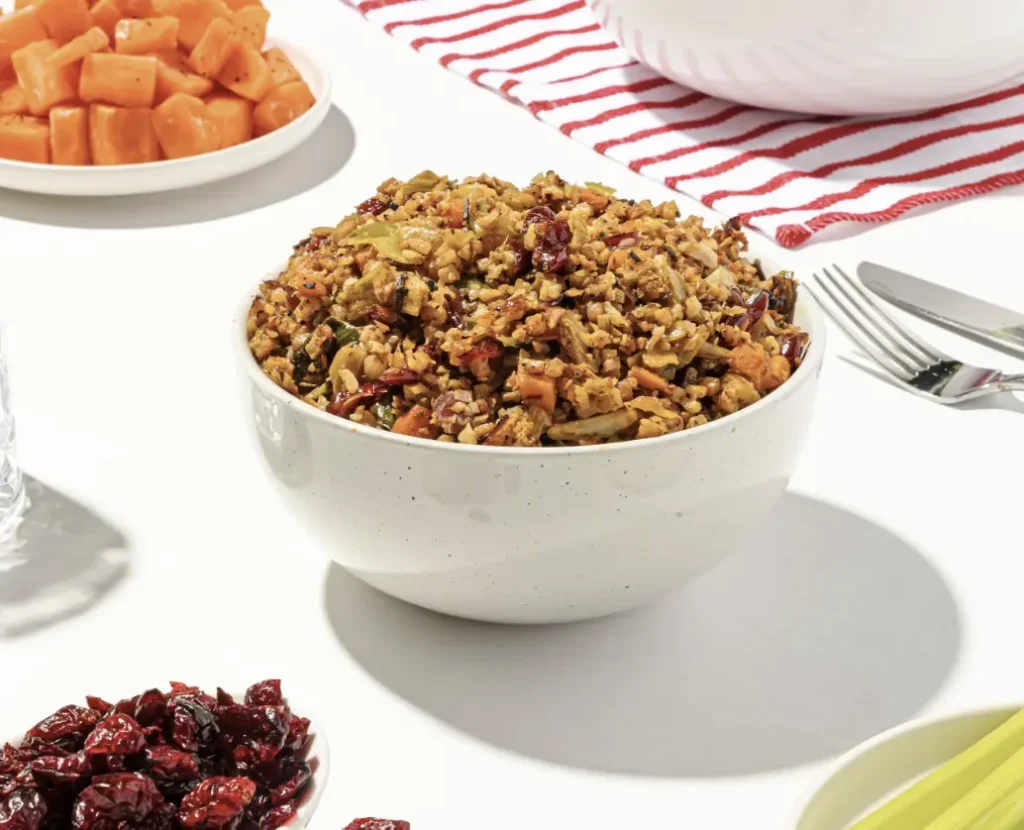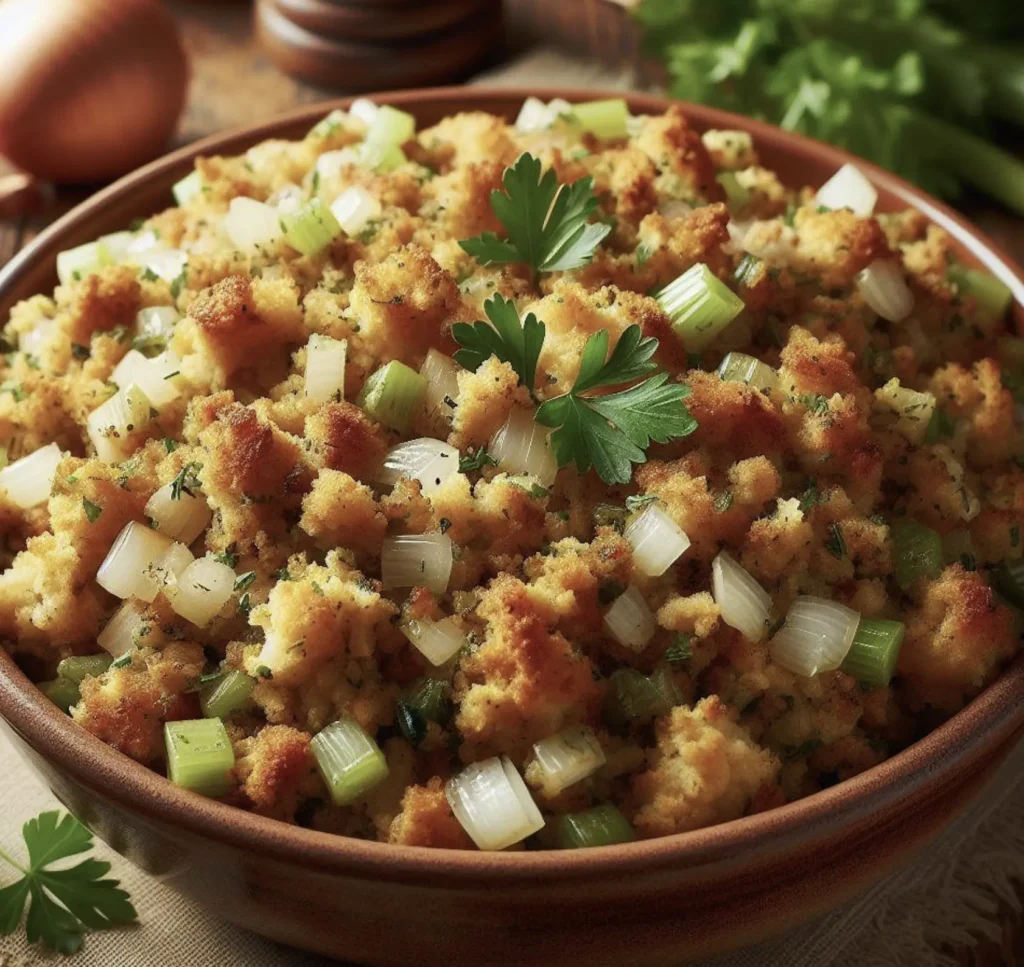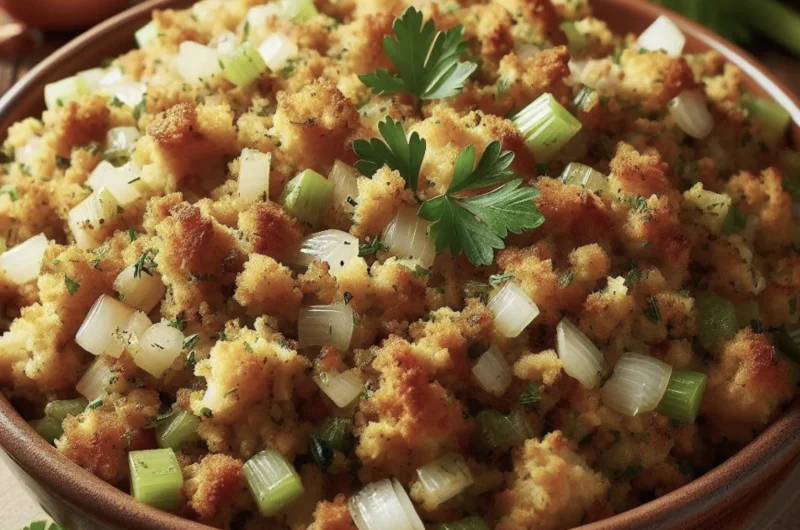Can you freeze dressing that is uncooked? A Guide for the Holiday Home Cook
Cold Beginnings: The Pre-Freeze Lowdown
Who’s ready for Thanksgiving dinner?! I am! At Kitchen Easy Life, it’s our time to shine! We LOVE cooking here and hey, what’s not to love about a holiday dedicated to food!? The time of year when every home cook dreams of the perfect side dish to accompany their golden turkey. Enter the big question: Can you freeze dressing that is uncooked?
The good news is, you’re not alone in wondering! Many home cooks have leftover stuffing or a batch of uncooked stuffing they’d love to prep ahead of the big day. And let’s face it, having some sides ready to go is a great way to get a head start on that holiday meal.
However, before you go tossing that cornbread dressing into the freezer willy-nilly, there are some things you ought to know. Not all foods take well to freezing, and the last thing you want is freezer burn on your precious side dish. And, certain ingredients, especially raw eggs, can present a food safety issue when not handled properly.
In this post, we’ll share the best ways to store that uncooked dressing. Whether you’re a fan of traditional bread stuffing, cornbread stuffing, or even something with a little poultry seasoning twist, we’ve got you covered.
And who knows? With the right techniques, you might just find that freezing your dressing is the best way to make your holiday season a tad bit easier! And that’s a win for Kitchen Easy Life, I might add!
And, for the best stuffing recipe to adorn your Thanksgiving table this year, or other holiday meals for that matter, check out our amazing Freezer-Friendly Traditional Cornbread Stuffing recipe! It just might steal the show this year!

Photo Credit: Tyler Nix
Chilling Facts: The Science Behind Freezing Foods
You might be thinking, “It’s just stuffing; how complex can it be?” But the freezing process, especially with dishes like homemade stuffing, can be a bit intricate. When you freeze any food, you’re essentially slowing down the formation of large ice crystals which can damage the cellular structure. This is especially crucial for a dish like uncooked dressing which contains fresh herbs and bread cubes.
Now, here’s the tricky bit: moisture. Foods with high moisture content, think chicken broth or cranberry sauce, can be challenging to freeze. The water in these ingredients expands as it freezes, leading to that dreaded freezer burn or a change in texture. That said, cornbread dressing, which tends to be a bit drier than other stuffings, might fare better in the freezer.
So, is it all doom and gloom? Not at all! The great news is that with a few simple steps, you can protect your uncooked stuffing from the ravages of the freezer. From choosing the right containers like airtight containers or freezer bags to pre-freezing your stuffing on a baking sheet to prevent the formation of large ice crystals, there are several ways to ensure the best results.
The Deep Freeze: Practical Steps
Alright, let’s get down to the nitty-gritty. If you’ve decided to give freezing your uncooked dressing a go, the first step is to ensure it’s at room temperature. This might sound like a no-brainer, but placing warm stuffing directly in the freezer can lead to the formation of large ice crystals, which we want to avoid. Remember, food safety first!
Next up, packaging. An airtight container is your best bet to prevent freezer burn. For all of my freezing, I always grab my airtight Rubbermaid containers. I trust the latch on them and they are BPA free which gives me peace of mind for my family’s health. To see the containers I used for freezing this cornbread dressing, check them out here.
I get commissions for purchases made through links in this post. As an Amazon Associate I earn from qualifying purchases.
However, if you’re short on containers, a double layer of plastic wrap followed by aluminum foil can do the trick. For those who prefer individual portions (perfect for those special occasions when you don’t want to thaw the whole batch), muffin tins are a fantastic option. Once frozen, pop those stuffing portions out and transfer them to a zip-top bag, ensuring you remove any excess air.
Duration is also crucial. While the idea of discovering a batch of forgotten uncooked dressing from three Thanksgivings ago might sound appealing, the reality is that even in the freezer, your stuffing has a shelf life. For the best results and to maintain that fresh taste, aim to use your frozen stuffing within a month.
The Thaw-some Truth: Defrosting Your Dressing
So, the big day has arrived, and you’re ready to cook up a storm. If you’ve wisely frozen some uncooked dressing ahead of time, the next step is to thaw it safely. The best way? Transfer your frozen dressing from the freezer to the refrigerator 24 hours before you plan to cook it. This slow thaw ensures even defrosting and maintains the texture of your dressing.
However, if you’ve forgotten (hey, it happens to the best of us!) and need a quicker solution, using a cold water bath can help. Place your airtight container or freezer bag of uncooked dressing in a sink filled with cold water, changing the water every 30 minutes. It’s essential to ensure that the dressing remains cold throughout this process to avoid any food safety issues.
Once thawed, it’s cooking time! Transfer your dressing to a baking dish, cover with aluminum foil, and bake as you usually would. Depending on the size and thickness, you might need to adjust the cooking time slightly. Keep an eye on it, and in no time, you’ll have a delicious side dish ready for your holiday table.
Saving Time, Not Compromising Taste: Tips and Tricks
So, the big day is approaching, and you’re wondering, Can you freeze dressing that is uncooked? The good news is that you can, and it’s a great way to get a head start on that bustling Thanksgiving dinner. Firstly, if you’re using chicken broth in your homemade stuffing, it’s vital to ensure that it cools down to room temperature before freezing. This prevents the formation of large ice crystals, which can affect the texture of your uncooked stuffing.
Another pro tip is to store your uncooked dressing in individual portions. Using muffin tins, pour in the dressing and freeze. Once frozen, transfer them to a freezer bag, making sure to remove excess air.
This method gives you the flexibility to defrost only what you need, perfect for those special occasions or even a regular side dish moment. And remember, always label your freezer bag with the date to avoid any food safety issues.
Now, about that leftover stuffing. A great addition to your post-holiday meals, freezing leftover stuffing is simple. For best results, spread it out on a baking sheet first. Once frozen, you can then transfer it to airtight containers or zip-top bags. This simple step ensures that your stuffing doesn’t freeze into one big lump, making it easier to reheat for future meals.
Common Freezer Faux Pas: Mistakes to Avoid
The holiday season is all about joy, laughter, and, let’s face it, a bit of stress in the kitchen. One big question many have is, Can you freeze dressing that is uncooked? Before you do, let’s discuss some common pitfalls. One major no-no is exposing your uncooked dressing to freezer burn. Using cling film or a layer of plastic wrap before sealing in an aluminum foil can protect your treasured side dish from the dreaded burn.
Another common mistake is not considering food safety. If your cornbread dressing contains raw eggs or chicken stock, it’s crucial to ensure that the uncooked dressing is cooled to room temperature before freezing. This prevents any safety issues and also ensures your dressing retains its fresh flavor. And while we’re on the topic of food safety, never refreeze uncooked dressing after it’s been thawed. It’s not just a taste issue but a safety issue too.
Lastly, while it might be tempting to just throw the uncooked dressing into the freezer in its baking dish, that’s not the best way. Using plastic food bags or airtight containers ensures that your uncooked dressing remains moist and delicious, without absorbing any unwanted freezer odors.
To Freeze or Not to Freeze: Weighing the Pros and Cons
So, Can you freeze dressing that is uncooked? Yes, you can! But like all things in life, there are pros and cons. On the upside, freezing your uncooked dressing gives you a head start on your Thanksgiving Day preparations. With a good freezer, you can store it for up to a month, ensuring that a delicious side dish is ready and waiting for the holiday meal.
However, there are a few downsides. For one, the texture might slightly differ from fresh uncooked dressing. Some ingredients, especially bread cubes like sourdough bread or cornbread, might become a tad mushier upon thawing. But if done right, the difference is minimal.
The key is to follow the recommended steps and avoid the common pitfalls we mentioned earlier.
In conclusion, freezing uncooked dressing is a good idea for those looking to reduce stress during the holiday season. With some planning and the right techniques, your Thanksgiving dinner can be a tad easier, giving you more time to enjoy with loved ones.
FAQs
1. Should You Freeze Stuffing Before or After Baking?
- Before Baking: Freezing stuffing before baking allows for a fresher taste upon cooking. It also means less work on the day of serving!
- After Baking: Freezing after baking offers convenience for reheating, ensuring a ready-to-eat meal. However, the texture might change slightly.
| Feature | Uncooked Stuffing | Cooked Stuffing |
|---|---|---|
| Preparation Time | Requires cooking post-thaw | Ready to reheat and serve |
| Texture After Thaw | Preserves original texture | May slightly alter texture |
| Safety | Must cook to proper temperature | Safer, but requires proper reheating |
| Shelf Life in Freezer | Up to 3 months | Up to 4 months |
| Convenience | More prep needed on serving day | Convenient for quick meals |
2. Can You Freeze Uncooked Stuffing with Raw Egg?
- Absolutely! Freezing uncooked stuffing with raw egg is safe. The freezing process halts bacterial growth, making it a practical choice. Just remember to cook it thoroughly after thawing.
3. Why Can’t You Refrigerate Uncooked Stuffing?
- Safety Concerns: Refrigerating uncooked stuffing, especially with raw ingredients like eggs or meat, poses a risk. Bacteria can grow at refrigeration temperatures, potentially leading to foodborne illnesses.
4. How Long Can You Keep Uncooked Cornbread Dressing in the Refrigerator?
- Short-term Storage: Ideally, keep it no longer than 24 hours. Beyond this, the risk of bacterial growth increases, even in the cold environment of a fridge.
5. Is It Better to Freeze Dressing Cooked or Uncooked?
- Cooked Dressing: Offers the convenience of quick reheating. However, texture might be slightly altered.
- Uncooked Dressing: Preserves freshness and texture better. Requires cooking post-thaw, which might be a bit more time-consuming.
The Final Verdict on Freezing Uncooked Turkey Dressing
Now that we’ve tackled the big question, Can you freeze dressing that is uncooked, I hope we’ve served up some savory answers. The verdict? With a little poultry seasoning and a sprinkle of care, you can indeed freeze your uncooked dressing, ensuring a tasty side dish ready for any festive occasion.
Just remember, while freezing is a fantastic way to get ahead, nothing beats the taste of freshly made dressing. But for those busy bees looking to save time without compromising on flavor, the freezer is your best friend.
So, this holiday season, whether you’re enjoying corn casserole, cranberry sauce, or our star side dish, here’s to delicious meals and memorable moments!
Kitchen Easy Life would like to wish you a stress-free, flavorful, and joyous holiday season! 🦃🍂🥂
best Freezer-Friendly traditional Cornbread Dressing Recipe
Course: DinnerCuisine: AmericanDifficulty: Easy8
servings20
minutes50
minutesA freezer-friendly cornbread dressing recipe that you can prepare ahead of time and cook later. Perfect for saving time during the busy holiday season or whenever you crave a comforting side dish.
Ingredients
6 cups of crumbled cornbread (preferably a day old for best texture)
4 slices of day-old white bread, torn into small pieces
1/2 cup unsalted butter
1 large onion, finely chopped
3 celery stalks, diced
2-3 cups chicken broth (adjust for desired moisture level)
2 large eggs, beaten
1/4 cup fresh parsley, chopped
1 teaspoon poultry seasoning
Salt and pepper to taste
Optional: 1/2 cup chopped pecans or sautéed sausage for added flavor
Directions
- Preparation:
- In a large mixing bowl, combine the crumbled cornbread and torn white bread.
- In a skillet over medium heat, melt the butter. Add the chopped onions and celery, sautéing until translucent and softened.
- Add the sautéed veggies to the bread mixture.
- Pour in the chicken broth a little at a time, mixing well after each addition. You’re aiming for a moist but not soggy consistency.
- Stir in the beaten eggs, fresh parsley, poultry seasoning, salt, and pepper. Mix until all ingredients are well combined. If you’re adding pecans or sausage, fold them in now.
- Freezing:
- Line a baking dish with a layer of plastic wrap, leaving extra on the sides to wrap over the top once filled.
- Transfer the dressing mixture into the lined baking dish, spreading it evenly.
- Fold the plastic wrap over the top, pressing down gently to remove any excess air.
- For an added layer of protection, wrap the entire dish in aluminum foil. This helps prevent freezer burn and keeps the dressing fresh.
- Label the dish with the date and contents.
- Place in the freezer. The dressing can be stored for up to 3 months.
- When you’re ready to cook the dressing, remove it from the freezer and let it thaw in the refrigerator for 24 hours.
- Preheat your oven to 375°F (190°C).
- Remove the plastic wrap and foil from the baking dish.
- Cover the dish with a new foil layer and bake in the preheated oven for 30 minutes.
- After 30 minutes, remove the foil and bake for an additional 10-15 minutes or until the top is golden brown and crispy.
Craving more delicious recipes? Try these: Homemade Thanksgiving Dressing

